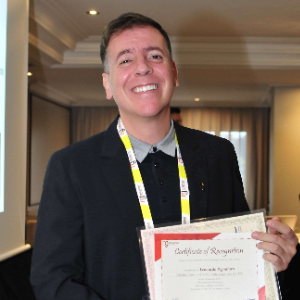Title : Ethanol modulates gene expression in the brain by activating the heat shock pathway
Abstract:
Chronic alcohol drinking causes profound physiological adaptations, which lead to physical dependence and tolerance. Some of these adaptations result from a complex chain of events that occur in the brain, long before a state of alcohol dependence is reached. Studies performed in animal models demonstrated that brief exposure to alcohol modifies the expression of various genes. This modulation of gene expression seems to be the underlying molecular mechanism responsible for the alteration of the brain circuits that result in tolerance and dependence. Although many alcohol-responsive genes have been identified; little is known about the mechanism/s through which alcohol modulates their expression. The current research demonstrates that physiological concentrations of ethanol (10-60mM) alter gene expression through the activation the heat shock cascade and the transcription factor heat shock factor 1 (HSF1) in both cortical neurons and glial cells. More specifically, we revealed that the ethanol activation of HSF1 results in the translocation of this transcription factor into the nuclei of cortical neurons and glial cells. This transcriptionally active factor binds to a novel DNA cis-acting regulatory element, present in the alcohol-responsive genes; a sequence that we named the alcohol response element (ARE). Results from microarray analysis of cortical neurons revealed that alcohol-induced genes are involved in synaptic transmission, neurotransmitter release, presynaptic calcium sensing, synaptic vesicle docking, synapse formation and plasticity. Alterations of this set of genes in neurons can explain the physiological changes that occur in the brain of alcoholics. Other genes activated by alcohol in neurons included: ethanol metabolism, oxidoreductase activity, insulin-like growth factor signaling, acetyl-CoA, and lipid metabolism genes. Finally, the microarray analysis conducted in astrocytes indicated that ethanol increased the expression of glial-specific immune-response genes, as well as genes involved in transcription regulation, proliferation, and differentiation. These results suggest that ethanol activates the immune response and causes oxidative stress in the glia and it canprovide an explanation for the inflammatory cell damage typically observed in the brains of alcoholics.
Audience take away:
• The audience will gain a deeper understanding of the molecular adaptive mechanisms triggered by alcohol that lead to tolerance and dependence.
• This work can help identify pharmacological opportunities for novel therapeutics to treat patients at risk of developing alcohol dependence.
• This research will allow investigator and teachers to explain the physiological and psychological changes observed in alcoholic individuals.
• The genes indentified by microarray analysis can explain the massive brain cell loss observed in alcoholics. This can help investigators to identify targets for clinical invervetions in patients.




